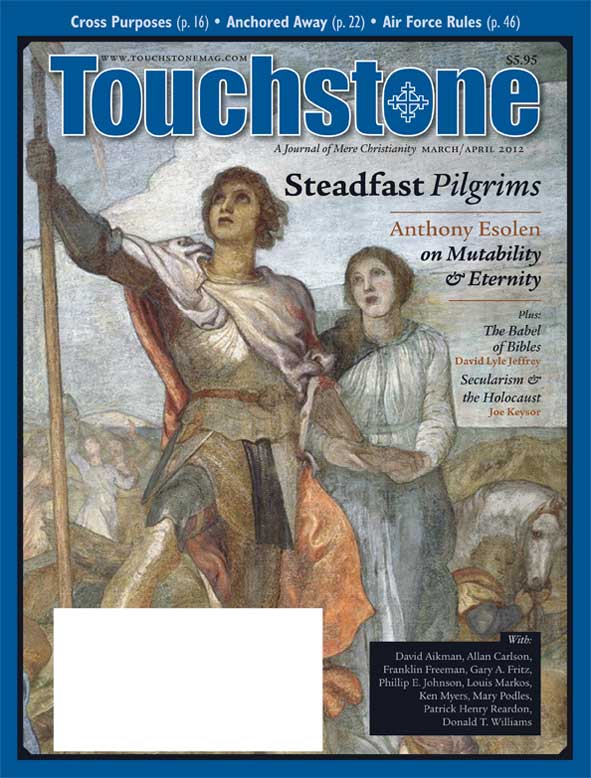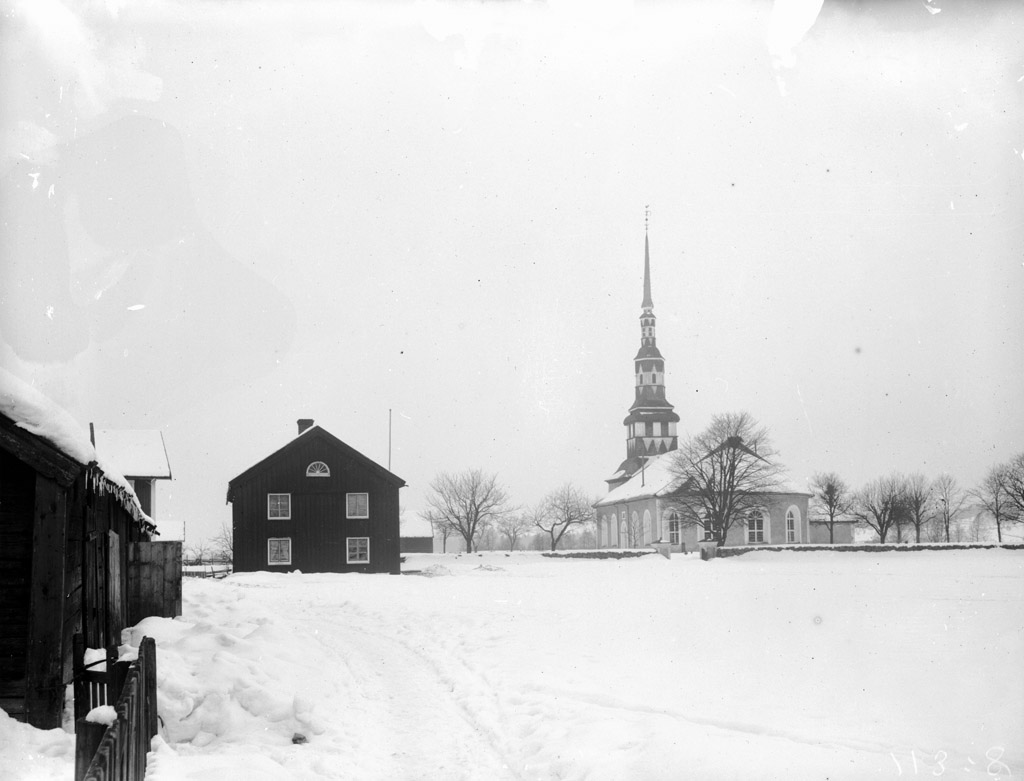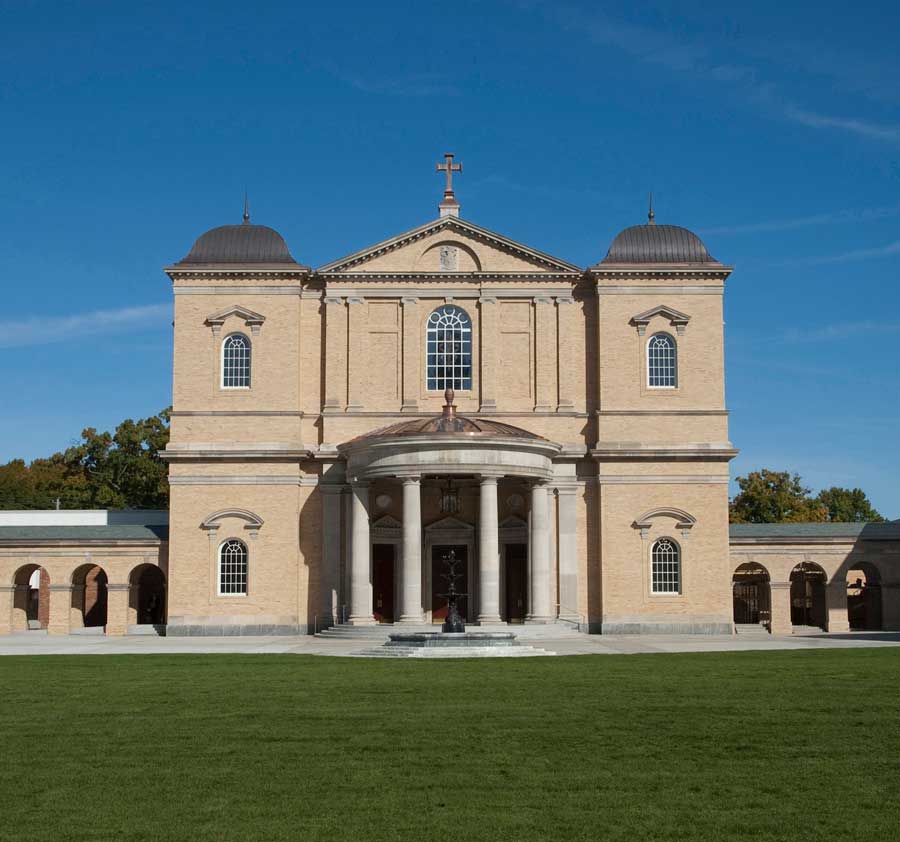God’s Place & Ours
On Mutability & the Lost Virtue of Steadfastness
by Anthony Esolen
Nearing the end of his life, the poet Edmund Spenser abandoned his project of writing an epic poem in twelve books, each celebrating a virtue rooted in nature and oriented beyond nature to the kingdom of God. But found among his works at his death were two cantos, and two stanzas of a third, apparently devoted to the virtue of constancy. These cantos recount a myth of how the goddess Mutability long ago attempted to assert superiority over all the other gods. Her argument is not only that she deserves to rule by virtue of her lineal descent from Saturn, but that she does rule de facto. All things change; and to prove her point, she brings forth a pageant of the seasons and the months and the hours, and argues that even the planets above, associated with the pantheon of pagan gods, wander from their paths.
The decision is to be rendered by a mysterious God of Nature, whose face is veiled, because no mortal can endure to look upon her brightness, like that of Christ transfigured before the astounded apostles on the holy mountain. At stake is no less than the meaning of the natural world. Is it a cosmos, or a chaos?

Nature must acknowledge change; it is everywhere to be seen. But she denies that Mutability has the last word. The meaning of change is not dissolution, but elevation into a higher order. Therefore, things in the natural world do not fall out of existence so much as they rise into it. Change is a mode of their being, but it is neither their essence nor their end:
I well consider all that you have said,
And find that all things steadfastness do hate
And changed be; yet being rightly weighed,
They are not changed from their first estate,
But by their change their beings do dilate,
And turning to themselves at length again
Do work their own perfection so by fate;
Then over them change doth not rule and reign
But they rule over change, and do their states maintain.
Steadfast Pilgrimage
The implications for the Christian life are subtle and profound. On the one hand, because we seek a firm abode, an eternal dwelling place, we find ourselves like strangers in a strange land, a pilgrim people, wandering upon the earth. Yet that dwelling place must also complete this life of pilgrimage. The destination is present in the first step taken; the fruit is inchoate in the seed. Here the words of the Psalmist should ring in our hearts, “I rejoiced when I heard them say, ‘Let us go up to the house of the Lord.’” In this sense, we are not wandering at all.
So the poet, in the last verses he ever wrote, and touched perhaps by the shadow of death, sees our days of change in the context of the seventh day, the consummation of the created world in the eternal Sabbath of God:
Then gin I think on that which Nature said,
Of that same time when no more change shall be
But steadfast rest of all things, firmly stay’d
Upon the pillars of Eternity,
That is contraire to Mutability;
For all that moveth doth in change delight,
But thenceforth all shall rest eternally
With Him that is the God of Sabaoth hight:
O that great Sabaoth God, grant me that Sabbath’s sight.
The key word in these two stanzas is steadfast. Spenser wishes us to understand its inner meaning, that of remaining fixed fast in one stead or place. The idea is deeply rooted in Scripture. The author of the letter to the Hebrews, in praising the firm faith of Abraham and the patriarchs, who saw the promises from afar and sojourned towards them as “pilgrims on the earth” (Heb. 11:13), reveals the unchanging and utterly reliable promise of God, who does not move from his vow, so that our hope can rest in him as surely as in an anchor:
God, willing more abundantly to shew unto the heirs of promise the immutability of his counsel, confirmed it by an oath: that by two immutable things, in which it was impossible for God to lie, we might have a strong consolation, who have fled for refuge to lay hold upon the hope set before us: which hope we have as an anchor of the soul, both sure and steadfast. (Heb. 6:17–19)
God’s truth does not move. When the psalmists think of that truth, it is not as facticity, but as the utterly reliable, the immovable, the steadfast: “The Lord is my rock, and my fortress, and my deliverer; my God, my strength, in whom I will trust” (Ps. 18:2). Jesus says that heaven and earth will pass away, but his words shall not pass away; and therefore, whoever heeds them is like “a wise man, who built his house upon a rock” (Matt. 7:24), unmoved by the violent changes of wind and flood.
The Compulsion of Perpetual Mobility
At first, it may seem that such steadfastness is purely spiritual. Jeremiah warns the Jews against considering the temple as a talisman, sufficient alone to guard them against their enemies. Jesus points out, to the dismay of his enemies, that there were many lepers in Israel in the time of the prophet Elisha, but only Naaman the Syrian, a pagan and a foreigner, was healed. The Lord sends his disciples to the ends of the earth, baptizing all nations. Philip preaches to the eunuch from Ethiopia. John writes his sublime Gospel from Ephesus, and during the reign of Domitian is exiled to the island of Patmos, where he is rapt in vision beyond the earth. Peter sojourns to the new Babylon, Rome, where he will be crucified, as the Lord had foretold. Paul’s journeys require a large map, and he, too, will find himself in Rome, where he will be beheaded outside the city walls, as a Roman citizen—ironically revealing by the manner of his death that the Christian’s ultimate citizenship is not to be found here below.
Something of this longing for what is not here, this joy of the pilgrimage, has set deep roots in the soul of Western man. But it has become detached from an end to the pilgrimage. We thus lose a sense of home, both the eternal and the temporal. So we seek new frontiers to discover and to master, but without any point beyond the assertion of mastery. We praise ourselves for our mobility, meaning that we can move, without noticing that without any sense of ultimate meaning, without any Person to whom we grant ultimate allegiance even in the smallest acts of our everyday lives, we must move. We are under compulsion of perpetual mobility precisely because, without God, to settle means to acknowledge defeat, and to rest means to die within.
The metaphysical condition of such a life is divorce. We change towns, we change schools, we change houses, we change husbands and wives, we change churches, we change faiths. We go off into the distance, and we set at a distance those nearby things we still pretend to cherish, as, for instance, our children. We look down upon women who “stay at home,” thinking of them rather as creatures who are stuck in mud. We almost treat as pious heroes those who are determined to leave their homes and never return, yet who still claim some tenuous and sentimental attachment to what they have abandoned. We invert the wisdom of St. Paul. We discard all things as if we discarded them not.
Una’s Single-Hearted Quest
What’s wrong? We can turn again to the poet. In Book One of The Faerie Queene, Spenser’s heroine Una must wander all about the countryside searching for her beloved Redcross Knight, who has been tricked by an enemy into believing that Una has been unfaithful, and who has then been seduced by the mage’s ally, the wicked Duessa. The names of the women are significant. “Blessed are the single hearted,” says Jesus, but those whose hearts are double, who have no steadfast object of devotion, go astray.
It’s interesting to note that when Redcross is in the company of Duessa, they don’t actually go anywhere. The seductress is perpetually weary. She brings him to the House of Pride, a gilded morgue for souls that were movers and shakers in the world, people like Alexander the Great and Caesar. Thus does the poet associate spiritual wandering with stasis; and Redcross will be reduced to a mere wraith, hopeless, languishing in a living death in the bowels of a dungeon, and then, once released, tempted to end his life in the cave of Despair. “Then do no further go, no further stray,” says that gloomy wretch, scribbling idly in the dust before him, a vicious parody of the forgiving Jesus.
But Una never gives up on her beloved. She helps to reclaim Redcross. She brings him to a hospital, the House of Holiness, where he is taught by Faith, Hope, and Charity. After Redcross’s victory over the dragon oppressing Una’s land, called Eden, she brings him to her mother and father, the king and queen. Una and Redcross pledge themselves to one another and celebrate a joyful wedding feast. For her steadfastness, Una is given the ironic and honorific name The Errant Damozell, she who set forth as a pilgrim to find her beloved, and who did not stray one inch from that love.
Devotion to the Particular
We are not angels, we are not disembodied wills. Jesus never instructs us to love “humanity.” He instructs us to love the all-too-physical and personal neighbor. We see in Scripture, alongside the embrace of the universal, the pious devotion to the particular. The risen Christ shared a breakfast of fish with a few of his close friends on the shore of the Sea of Galilee. Why there? It was the scene of his most joyous preaching; it was where he had chosen most of the apostles. In Galilee had Jesus spent thirty years of his life, in the no-account village of Nazareth. There he worked and played, rejoiced and mourned and worshiped with his kin and his neighbors. Most of them were slow to understand who he was, if they ever did; and Jesus says, sadly, that a prophet is not without honor except in his homeland. His countrymen took him for granted. They rejected him. But he did not reject them. Says the angel to the women on that Easter morning, “He goes before you to Galilee.”
The prophets do not say that there will be Zions everywhere. They say that all nations will come unto Zion, and “all the ends of the earth shall see the salvation of our God” (Is. 52:10). The metaphysical condition of the faithful Christian is not divorce but marriage, not mobility and mutability but steadfastness. “Can a woman forget her sucking child, that she should not have compassion on the son of her womb?” asks the Lord. “Yea, they may forget, yet will I not forget thee” (Is. 49:15).
Consider the image. The child longs for the mother, for her breast; he feeds from her very substance. It is that intimacy of place and person that expresses, in more than a metaphor, the steadfast love of God for his people. For the Lord “hateth putting away,” says the prophet (Mal. 2:16). On what grounds may a man divorce his wife? Jesus dismisses the motive behind divorce entirely. A man moves from his mother and father so that he may “cleave to his wife: and they twain shall be one flesh” (Matt. 19:5). The young man who had squandered his inheritance in that ever-seductive “far country,” when he came to his senses, did not say, “I must leave this pigsty and follow my fortune elsewhere.” He said, “I will arise and go to my father” (Luke 15:18). The Lord is the Good Shepherd who seeks the one sheep gone astray. “Jerusalem, my happy home,” sings the poet, “when shall I come
to thee?”
Perfected Love for the Eternal Home
There is a difference between being in a location, and dwelling; between remaining, with its sense of having been left behind by the more adventurous, and abiding, with its sense of devotion and full-hearted peace. “How amiable are thy tabernacles, O Lord of hosts!” cries the Psalmist (84:1). “He that eateth my flesh, and drinketh my blood, dwelleth in me, and I in him,” says Jesus, offering to us wayfarers more than an inn along the road, but the most real and personal dwelling place imaginable (John 6:56).
Just as our piety to God is the source and the fulfillment of our piety to our father and mother—just as the commandments that orient us towards the one God, his holiness, and his eternal peace, imply and perfect our duty to honor the particular people who brought us into being—so, too, our love of home and homeland is perfected in our love for the true home, the new Jerusalem. “If I forget thee, O Jerusalem,” sings the captive of Babylon, “let my right hand forget her cunning” (Ps. 137:5). That loyalty to the land and the city is raised to the sublime in our steadfast longing for the very presence of God: “My soul thirsteth for God, for the living God; when shall I come and appear before God?” (Ps. 42:2).
It is doubtful whether, without steadfastness, without devotion to this place, this work, this spouse, this land, we can enjoy even a decent human life. A tumbleweed is not only rootless. It is directionless. It is blown about by the chance of the wind, quitting here, divorcing there, forgetting here, abandoning there. In following our own purposes, regardless of the claims of steadfastness upon us, we lose our purpose, and turn with every turn of the fickle heart.
Such a person is, moreover, no pilgrim. The tumbleweed does not range across the plains and mountains to fulfill a vow at the shrine of St. James—for that devotion is the origin of our word pilgrim. The tumbleweed does not cross the seas to walk in the steps of Jesus, bringing back branches in memorial—the origin of our word palmer. The monk who takes a vow of stability, lest he be vagabundus—vagabond, literally “full of wandering”—can stride the more confidently along his pilgrimage to the city of God.
We are not all monks. But we are parents, and children, and neighbors, and citizens. God has given us one another, and our homes, as worthy objects of our steadfast love, and as the grounds for preparing ourselves for the eternal home, the city of everlasting foundations. That Jerusalem is illuminated neither by the turning sun or moon, nor by the electric static of the news, such as it always is, but by the eternal glory of God, and the Lamb. •
Anthony Esolen is Distinguished Professor of Humanities at Thales College and the author of over 30 books, including Real Music: A Guide to the Timeless Hymns of the Church (Tan, with a CD), Out of the Ashes: Rebuilding American Culture (Regnery), and The Hundredfold: Songs for the Lord (Ignatius). He has also translated Dante’s Divine Comedy (Random House) and, with his wife Debra, publishes the web magazine Word and Song (anthonyesolen.substack.com). He is a senior editor of Touchstone.
subscription options
Order
Print/Online Subscription

Get six issues (one year) of Touchstone PLUS full online access including pdf downloads for only $39.95. That's only $3.34 per month!
Order
Online Only
Subscription

Get a one-year full-access subscription to the Touchstone online archives for only $19.95. That's only $1.66 per month!
bulk subscriptions
Order Touchstone subscriptions in bulk and save $10 per sub! Each subscription includes 6 issues of Touchstone plus full online access to touchstonemag.com—including archives, videos, and pdf downloads of recent issues for only $29.95 each! Great for churches or study groups.
Transactions will be processed on a secure server.
more from the online archives
calling all readers
Please Donate
"There are magazines worth reading but few worth saving . . . Touchstone is just such a magazine."
—Alice von Hildebrand
"Here we do not concede one square millimeter of territory to falsehood, folly, contemporary sentimentality, or fashion. We speak the truth, and let God be our judge. . . . Touchstone is the one committedly Christian conservative journal."
—Anthony Esolen, Touchstone senior editor









